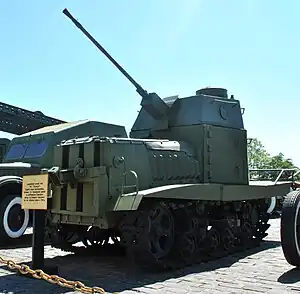NI tank
The NI tank also known as the Odessa tank (/ˈniː/; Russian: Танк НИ tank NI, abbr. На испуг, Na ispug, literally "for fright"), was a Soviet improvised fighting vehicle, based on an STZ-3 agricultural tractor, manufactured in Odessa during the Siege of Odessa in World War II.[1]
| NI | |
|---|---|
 Reproduction NI-1 at the National Museum of the History of Ukraine in the Second World War | |
| Type | Improvised fighting vehicle |
| Place of origin | |
| Service history | |
| In service | 1941 |
| Used by | Soviet Union |
| Wars | World War II |
| Production history | |
| Designed | 1941 |
| Manufacturer | January Uprising Mechanical Plant (Odessa)[1] |
| Produced | 1941 |
| No. built | 69 |
| Specifications | |
| Mass | 7 tonnes |
| Crew | 2–3 |
| Engine | 1MA |
Development

At the beginning of the war between the Axis and the Soviet Union, a majority of the factories were evacuated, including most of the equipment from the January Uprising Factory. There was machinery left and it was decided that it would be used to service battle-damaged tanks arriving from the front.[1]
When the army fighting on the outskirts of Odessa (the city defences held out for seventy-two days before the army pulled back) started experiencing shortages in tanks, the workers from the factory decided to build a fighting vehicle of their own design. Aided by the workers from other factories, the workers of the January Uprising factory built a large metal box and mounted it on the tractor. Also added was a traversable turret with either a mountain gun or a large-calibre machine gun. The armour was a sandwich of thin naval steel or boiler plate and wood or rubber sheeting to improve protection against small arms. The resulting machine was one of the many different improvised fighting vehicles developed during the war; however it was unlike any other fighting vehicle of the time due to its sizeable production and loud noise when it moved.
Armament was varied to whatever was on hand during the siege, including machine guns, the ShVAK cannon, turrets from T-26, T-38 and BT tank turrets with 37 mm Model 15R mountain guns or 45 mm anti-tank guns .
Production history
During the siege of Odessa, a total of 69 NI tanks were produced.[2] These then fought during the siege against the Axis forces in support of soviet troops.
Combat use
68 NI tanks (all but one) were captured by the Axis-aligned Romanians by the end of the siege,[3] with 14 still being on hand as of 1 November 1942.[4]
See also
Tanks of comparable role, performance, and era
- American Disston Tractor Tank
- New Zealand Bob Semple tank
- New Zealand Schofield tank
- Soviet KhTZ-16
References
- Н. И. Крылов. Не померкнет никогда. М., Воениздат, 1984. стр.107-109
- Тыл советских вооружённых сил в Великой Отечественной войне 1941-1945 гг. // колл. авт., под ред. генерала армии С. К. Куркоткина. М., Воениздат, 1977. стр.438
- Ștefănescu 2020, p. 314.
- Mark Axworthy, Cornel I. Scafeș, Cristian Crăciunoiu, Third Axis, Fourth Ally: Romanian Armed Forces in the European War, 1941-1945, Arms and Armour, 1995, p. 220
- Ștefănescu, Alexandru V. (2020). În umbra marelui Reich: Tehnica de luptă a armatei române pe Frontul de Est (1941–1944) [In the Shadow of the Great Reich: Battle Technique of the Romanian Army on the Eastern Front (1941–1944)] (in Romanian). Târgoviște, Romania: Cetatea de Scaun. ISBN 9786065375055.
- Tekhnika Molodezhi (1979). "Odesskiy Tank". Retrieved December 30, 2005. (in Russian)
- Zaloga, Steven J., James Grandsen (1984). Soviet Tanks and Combat Vehicles of World War Two, p. 142. London: Arms and Armour Press. ISBN 0-85368-606-8.
External links
- Bronetraktory — Combat tractors, part 3 (in Russian)
- http://www.tanks-encyclopedia.com/ww2/soviet/soviet_NI_Odessa_tank.php - Probably the most detailed and extensive account on the NI tank available in English.